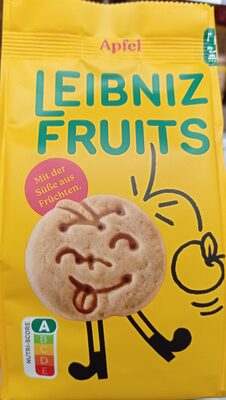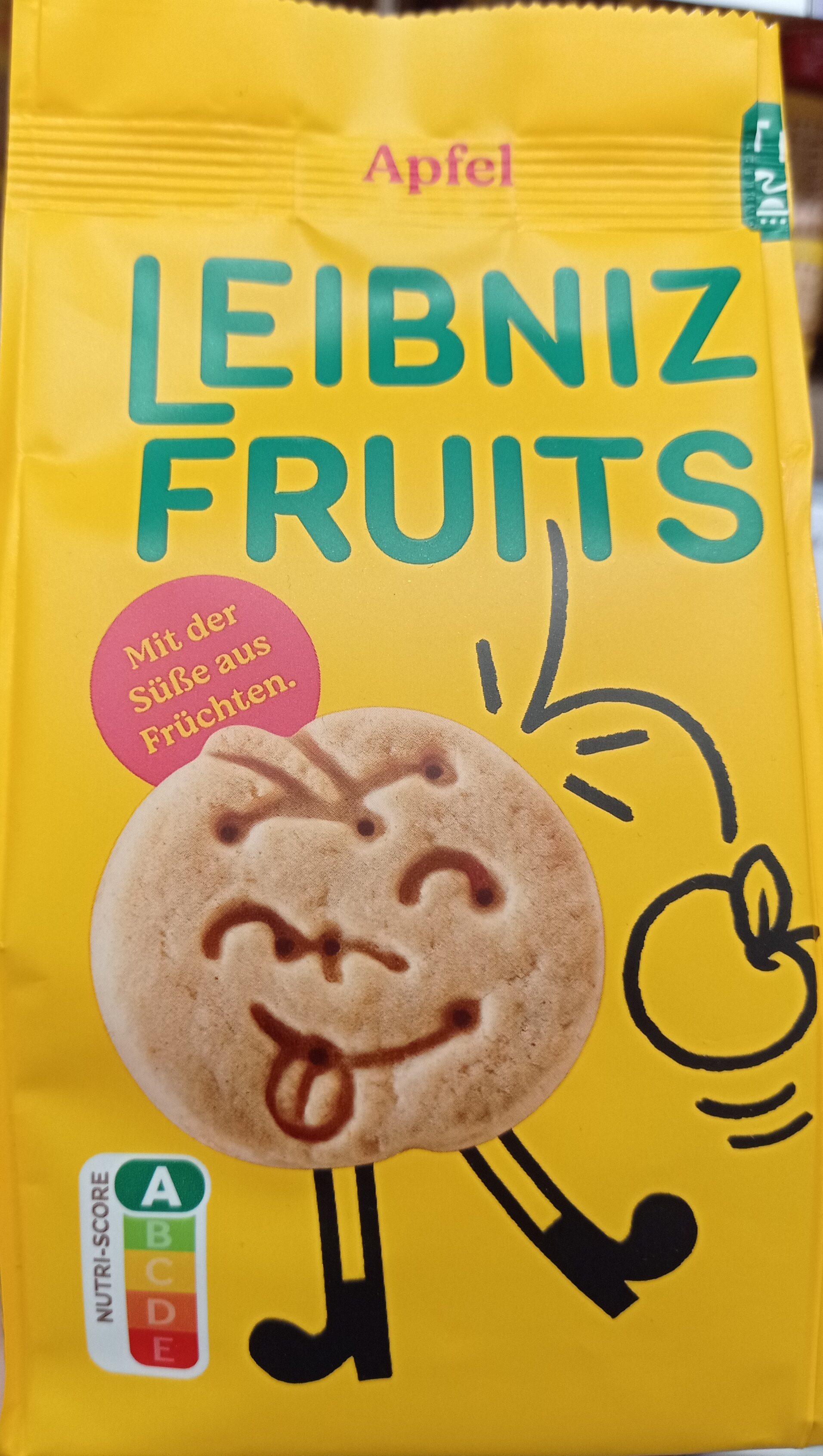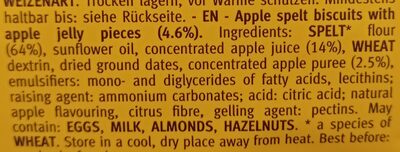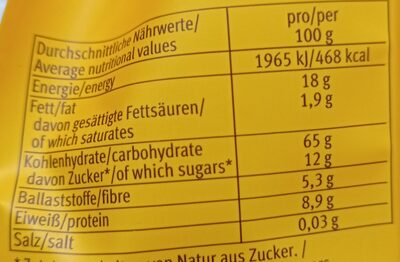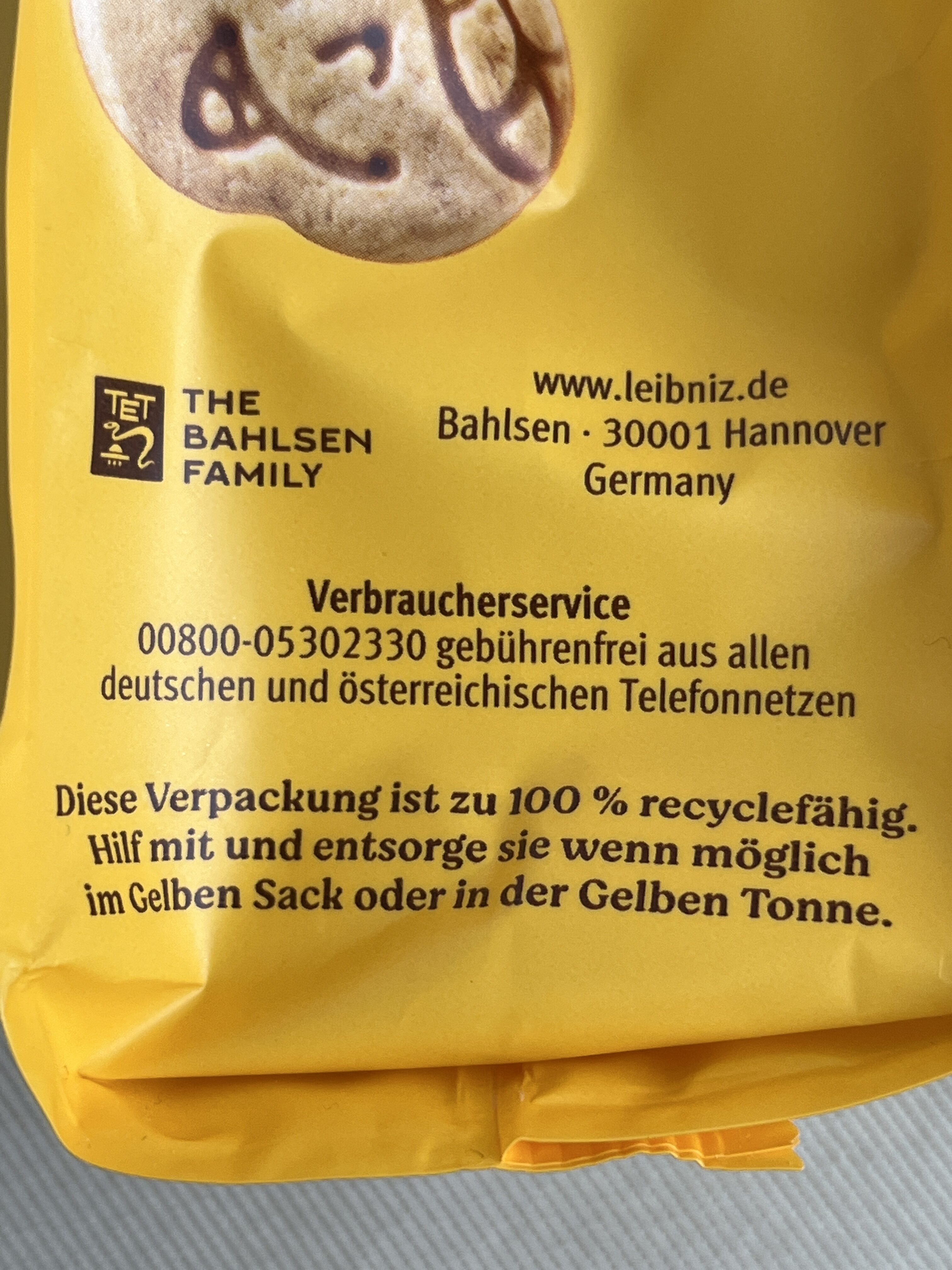Help us make food transparency the norm!
As a non-profit organization, we depend on your donations to continue informing consumers around the world about what they eat.
The food revolution starts with you!
Leibniz Fruits Apfel - Bahlsen - 100 g
Leibniz Fruits Apfel - Bahlsen - 100 g
This product page is not complete. You can help to complete it by editing it and adding more data from the photos we have, or by taking more photos using the app for Android or iPhone/iPad. Thank you!
×
Barcode: 4017100134319 (EAN / EAN-13)
Quantity: 100 g
Packaging: Kunststoff
Categories: Plant-based foods and beverages, Plant-based foods, Snacks, Cereals and potatoes, Sweet snacks, Cereals and their products, Biscuits and cakes, Biscuits, Cakes, Puffed cereal cakes, Puffed wheat cakes, Fruit cakes, Puffed spelt cakes
Labels, certifications, awards: Vegetarian, Vegan, Nutriscore, Nutriscore Grade A
Countries where sold: Germany
Matching with your preferences
Health
Ingredients
-
17 ingredients
SPELT* flour (64%), sunflower oil, concentrated apple juice (14%), WHEAT dextrin, dried ground dates, concentrated apple puree (2.5%), emulsifiers: mono - and diglycerides of fatty acids, lecithins; raising agent: ammonium carbonates; acid: citric acid; natural apple flavouring, citrus fibre, gelling agent: pectins. May contain: EGGS, MILK, ALMONDS, HAZELNUTS. *a species of WHEAT.Allergens: GlutenTraces: Eggs, Milk, Nuts
Food processing
-
Ultra processed foods
Elements that indicate the product is in the 4 - Ultra processed food and drink products group:
- Additive: E1400 - Dextrin
- Additive: E322 - Lecithins
- Additive: E440 - Pectins
- Additive: E471 - Mono- and diglycerides of fatty acids
- Ingredient: Emulsifier
- Ingredient: Flavouring
- Ingredient: Gelling agent
Food products are classified into 4 groups according to their degree of processing:
- Unprocessed or minimally processed foods
- Processed culinary ingredients
- Processed foods
- Ultra processed foods
The determination of the group is based on the category of the product and on the ingredients it contains.
Additives
-
E1400 - Dextrin
Dextrin: Dextrins are a group of low-molecular-weight carbohydrates produced by the hydrolysis of starch or glycogen. Dextrins are mixtures of polymers of D-glucose units linked by α--1→4- or α--1→6- glycosidic bonds. Dextrins can be produced from starch using enzymes like amylases, as during digestion in the human body and during malting and mashing, or by applying dry heat under acidic conditions -pyrolysis or roasting-. The latter process is used industrially, and also occurs on the surface of bread during the baking process, contributing to flavor, color and crispness. Dextrins produced by heat are also known as pyrodextrins. The starch hydrolyses during roasting under acidic conditions, and short-chained starch parts partially rebranch with α--1‚6- bonds to the degraded starch molecule. See also Maillard Reaction. Dextrins are white, yellow, or brown powders that are partially or fully water-soluble, yielding optically active solutions of low viscosity. Most of them can be detected with iodine solution, giving a red coloration; one distinguishes erythrodextrin -dextrin that colours red- and achrodextrin -giving no colour-. White and yellow dextrins from starch roasted with little or no acid are called British gum.Source: Wikipedia
-
E322 - Lecithins
Lecithins are natural compounds commonly used in the food industry as emulsifiers and stabilizers.
Extracted from sources like soybeans and eggs, lecithins consist of phospholipids that enhance the mixing of oil and water, ensuring smooth textures in various products like chocolates, dressings, and baked goods.
They do not present any known health risks.
-
E330 - Citric acid
Citric acid is a natural organic acid found in citrus fruits such as lemons, oranges, and limes.
It is widely used in the food industry as a flavor enhancer, acidulant, and preservative due to its tart and refreshing taste.
Citric acid is safe for consumption when used in moderation and is considered a generally recognized as safe (GRAS) food additive by regulatory agencies worldwide.
-
E440 - Pectins
Pectins (E440) are natural carbohydrates, predominantly found in fruits, that act as gelling agents in the food industry, creating the desirable jelly-like texture in jams, jellies, and marmalades.
Pectins stabilize and thicken various food products, such as desserts, confectioneries, and beverages, ensuring a uniform consistency and quality.
Recognized as safe by various health authorities, pectins have been widely used without notable adverse effects when consumed in typical dietary amounts.
-
E471 - Mono- and diglycerides of fatty acids
Mono- and diglycerides of fatty acids (E471), are food additives commonly used as emulsifiers in various processed foods.
These compounds consist of glycerol molecules linked to one or two fatty acid chains, which help stabilize and blend water and oil-based ingredients. E471 enhances the texture and shelf life of products like margarine, baked goods, and ice cream, ensuring a smooth and consistent texture.
It is generally considered safe for consumption within established regulatory limits.
-
E503 - Ammonium carbonates
Ammonium carbonate: Ammonium carbonate is a salt with the chemical formula -NH4-2CO3. Since it readily degrades to gaseous ammonia and carbon dioxide upon heating, it is used as a leavening agent and also as smelling salt. It is also known as baker's ammonia and was a predecessor to the more modern leavening agents baking soda and baking powder. It is a component of what was formerly known as sal volatile and salt of hartshorn.Source: Wikipedia
-
E503i - Ammonium carbonate
Ammonium carbonate: Ammonium carbonate is a salt with the chemical formula -NH4-2CO3. Since it readily degrades to gaseous ammonia and carbon dioxide upon heating, it is used as a leavening agent and also as smelling salt. It is also known as baker's ammonia and was a predecessor to the more modern leavening agents baking soda and baking powder. It is a component of what was formerly known as sal volatile and salt of hartshorn.Source: Wikipedia
Ingredients analysis
-
May contain palm oil
Ingredients that may contain palm oil: E471
-
Vegan
No non-vegan ingredients
-
Vegetarian
No non-vegetarian ingredients detected
-
Details of the analysis of the ingredients
: DINKELMEHL 64%, Sonnenblumenöl, Apfelsaft-konzentrat 14%, WEIZENDEXTRIN, Datteln, Apfel 2.5%, Emulgatoren (mono- und Diglyceride von Speisefettsäuren), Lecithine, Backtriebmittel (Ammoniumcarbonate), Säuerungsmittel (Citronensäure), natürliches Apfelaroma, Citrusfaser, Geliermittel (Pektine)- DINKELMEHL -> en:spelt-flour - vegan: yes - vegetarian: yes - ciqual_food_code: 9480 - percent_min: 64 - percent: 64 - percent_max: 64
- Sonnenblumenöl -> en:sunflower-oil - vegan: yes - vegetarian: yes - from_palm_oil: no - ciqual_food_code: 17440 - percent_min: 14 - percent_max: 14.5
- Apfelsaft-konzentrat -> en:apple-juice-from-concentrate - vegan: yes - vegetarian: yes - ciqual_food_code: 2074 - percent_min: 14 - percent: 14 - percent_max: 14
- WEIZENDEXTRIN -> en:e1400 - vegan: yes - vegetarian: yes - percent_min: 2.5 - percent_max: 3
- Datteln -> en:date - vegan: yes - vegetarian: yes - ciqual_food_code: 13011 - percent_min: 2.5 - percent_max: 3
- Apfel -> en:apple - vegan: yes - vegetarian: yes - ciqual_food_code: 13050 - percent_min: 2.5 - percent: 2.5 - percent_max: 2.5
- Emulgatoren -> en:emulsifier - percent_min: 0 - percent_max: 0.5
- mono- und Diglyceride von Speisefettsäuren -> en:e471 - vegan: maybe - vegetarian: maybe - from_palm_oil: maybe - percent_min: 0 - percent_max: 0.5
- Lecithine -> en:e322 - vegan: maybe - vegetarian: maybe - percent_min: 0 - percent_max: 0.5
- Backtriebmittel -> en:raising-agent - percent_min: 0 - percent_max: 0.5
- Ammoniumcarbonate -> en:e503i - vegan: yes - vegetarian: yes - percent_min: 0 - percent_max: 0.5
- Säuerungsmittel -> en:acid - percent_min: 0 - percent_max: 0.5
- Citronensäure -> en:e330 - vegan: yes - vegetarian: yes - percent_min: 0 - percent_max: 0.5
- natürliches Apfelaroma -> en:natural-apple-flavouring - vegan: maybe - vegetarian: maybe - percent_min: 0 - percent_max: 0.5
- Citrusfaser -> en:citrus-fibre - vegan: yes - vegetarian: yes - percent_min: 0 - percent_max: 0.5
- Geliermittel -> en:gelling-agent - percent_min: 0 - percent_max: 0.5
- Pektine -> en:e440a - vegan: yes - vegetarian: yes - percent_min: 0 - percent_max: 0.5
Nutrition
-
Very good nutritional quality
⚠ ️Warning: the amount of fruits, vegetables and nuts is not specified on the label, it was estimated from the list of ingredients: 19This product is not considered a beverage for the calculation of the Nutri-Score.
Positive points: 10
- Proteins: 5 / 5 (value: 8.9, rounded value: 8.9)
- Fiber: 5 / 5 (value: 5.3, rounded value: 5.3)
- Fruits, vegetables, nuts, and colza/walnut/olive oils: 0 / 5 (value: 19.25, rounded value: 19.3)
Negative points: 8
- Energy: 5 / 10 (value: 1958, rounded value: 1958)
- Sugars: 2 / 10 (value: 12, rounded value: 12)
- Saturated fat: 1 / 10 (value: 1.9, rounded value: 1.9)
- Sodium: 0 / 10 (value: 12, rounded value: 12)
The points for proteins are counted because the negative points are less than 11.
Nutritional score: (8 - 10)
Nutri-Score:
-
Nutrient levels
-
Fat in moderate quantity (18%)
What you need to know- A high consumption of fat, especially saturated fats, can raise cholesterol, which increases the risk of heart diseases.
Recommendation: Limit the consumption of fat and saturated fat- Choose products with lower fat and saturated fat content.
-
Saturated fat in moderate quantity (1.9%)
What you need to know- A high consumption of fat, especially saturated fats, can raise cholesterol, which increases the risk of heart diseases.
Recommendation: Limit the consumption of fat and saturated fat- Choose products with lower fat and saturated fat content.
-
Sugars in moderate quantity (12%)
What you need to know- A high consumption of sugar can cause weight gain and tooth decay. It also augments the risk of type 2 diabetes and cardio-vascular diseases.
Recommendation: Limit the consumption of sugar and sugary drinks- Sugary drinks (such as sodas, fruit beverages, and fruit juices and nectars) should be limited as much as possible (no more than 1 glass a day).
- Choose products with lower sugar content and reduce the consumption of products with added sugars.
-
Salt in low quantity (0.03%)
What you need to know- A high consumption of salt (or sodium) can cause raised blood pressure, which can increase the risk of heart disease and stroke.
- Many people who have high blood pressure do not know it, as there are often no symptoms.
- Most people consume too much salt (on average 9 to 12 grams per day), around twice the recommended maximum level of intake.
Recommendation: Limit the consumption of salt and salted food- Reduce the quantity of salt used when cooking, and don't salt again at the table.
- Limit the consumption of salty snacks and choose products with lower salt content.
-
-
Nutrition facts
Nutrition facts As sold
for 100 g / 100 mlCompared to: Puffed spelt cakes Energy 1,958 kj
(468 kcal)+21% Fat 18 g +175% Saturated fat 1.9 g -21% Carbohydrates 65 g +1% Sugars 12 g +194% Fiber 5.3 g -37% Proteins 8.9 g -30% Salt 0.03 g -74% Fruits‚ vegetables‚ nuts and rapeseed‚ walnut and olive oils (estimate from ingredients list analysis) 19.25 %
Environment
-
Eco-Score C - Moderate environmental impact
⚠ ️Select a country in order to include the full impact of transportation.The Eco-Score is an experimental score that summarizes the environmental impacts of food products.→ The Eco-Score was initially developped for France and it is being extended to other European countries. The Eco-Score formula is subject to change as it is regularly improved to make it more precise and better suited to each country.Life cycle analysis
-
Average impact of products of the same category: B (Score: 74/100)
Category: Fruit cake
Category: Fruit cake
- PEF environmental score: 0.32 (the lower the score, the lower the impact)
- including impact on climate change: 2.51 kg CO2 eq/kg of product
Stage Impact Agriculture
75.3 %Processing
12.2 %Packaging
7.4 %Transportation
3.5 %Distribution
1.5 %Consumption
0.0 %
Bonuses and maluses
-
Missing origins of ingredients information
Malus: -5
⚠ ️ The origins of the ingredients of this product are not indicated.
If they are indicated on the packaging, you can modify the product sheet and add them.
If you are the manufacturer of this product, you can send us the information with our free platform for producers.
-
Packaging with a medium impact
Malus: -10
Shape Material Recycling Impact Unknown Plastic High ⚠ ️ The information about the packaging of this product is not sufficiently precise (exact shapes and materials of all components of the packaging).⚠ ️ For a more precise calculation of the Eco-Score, you can modify the product page and add them.
If you are the manufacturer of this product, you can send us the information with our free platform for producers.
Eco-Score for this product
-
Impact for this product: C (Score: 59/100)
Product: Leibniz Fruits Apfel - Bahlsen - 100 g
Life cycle analysis score: 74
Sum of bonuses and maluses: -15
Final score: 59/100
-
Carbon footprint
-
Equal to driving 1.3 km in a petrol car
251 g CO² per 100g of product
The carbon emission figure comes from ADEME's Agribalyse database, for the category: Fruit cake (Source: ADEME Agribalyse Database)
Stage Impact Agriculture
74.0 %Processing
8.5 %Packaging
11.2 %Transportation
5.5 %Distribution
0.8 %Consumption
0.0 %
Packaging
-
Packaging with a medium impact
-
Packaging parts
(Plastic)
-
Packaging materials
Material % Packaging weight Packaging weight per 100 g of product Plastic
-
Transportation
-
Origins of ingredients
Missing origins of ingredients information
⚠ ️ The origins of the ingredients of this product are not indicated.
If they are indicated on the packaging, you can modify the product sheet and add them.
If you are the manufacturer of this product, you can send us the information with our free platform for producers.Add the origins of ingredients for this product Add the origins of ingredients for this product
Report a problem
-
Incomplete or incorrect information?
Category, labels, ingredients, allergens, nutritional information, photos etc.
If the information does not match the information on the packaging, please complete or correct it. Open Food Facts is a collaborative database, and every contribution is useful for all.
Data sources
Product added on by kiliweb
Last edit of product page on by chevalstar.
Product page also edited by moon-rabbit, obabazi, roboto-app, yuka.sY2b0xO6T85zoF3NwEKvlmtGAsThhR2aPTvln0OB7PqHJYG0T9ZS_7T5HKs.
